Submitted by Jeff on Fri, 04/28/2006 - 11:04
 I have seen very few of my favorite movies in the theater. This is just one of the realities that young cinephiles must accept. Even when I go see Chinatown or Blue Velvet in repertory cinemas, it isn't the first time I'm seeing those films. A lot of the magic happens on DVD.
I have seen very few of my favorite movies in the theater. This is just one of the realities that young cinephiles must accept. Even when I go see Chinatown or Blue Velvet in repertory cinemas, it isn't the first time I'm seeing those films. A lot of the magic happens on DVD.
United 93 gave me a magical theatrical experience, the likes of which I can only remember feeling twice in recent memory (Requiem for a Dream and Birth).
Going in to the Tribeca premiere, my expectations were occupied by the questions the trades have all been asking about the film: "Are audiences ready for a movie about 9/11?" and "How tasteful will the film be?" For me, the answer to both of these questions has to do with how "definitive" the film attempts to be - if it achieves the status of being the "definitive" 9/11 movie, then audiences are probably more likely to accept it. At the same time, it is precisely that aim for "definitiveness" that strikes me as distasteful.
Though the extra-textual United 93 marketing campaign will self-righteously try and paint the film as "the definitive 9/11 movie" (as Paramount will try to do later this year for Oliver Stone's World Trade Center), United 93 itself manages to avoid such self-importance in at least three ways. Read on...
Submitted by Jeff on Wed, 04/26/2006 - 00:15
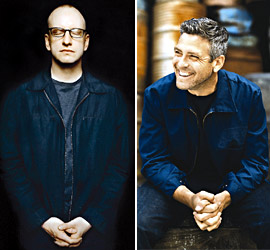 The “auteur” is a filmmaker who is generally expected to make personal cinema. Auteur-films tend to be celebrated for how well they relate unique experience – in terms of theme, Bergman’s preoccupation with death or Truffaut’s with youth; in terms of style, Hitchcock’s use of suspense or Rossellini’s minimalism; in terms of location, Scorsese’s Little Italy or Paul Thomas Anderson’s Valley or Malick’s countryside. The specificity of the auteur’s experience is met by a specific audience. In other words, a limited one.
The “auteur” is a filmmaker who is generally expected to make personal cinema. Auteur-films tend to be celebrated for how well they relate unique experience – in terms of theme, Bergman’s preoccupation with death or Truffaut’s with youth; in terms of style, Hitchcock’s use of suspense or Rossellini’s minimalism; in terms of location, Scorsese’s Little Italy or Paul Thomas Anderson’s Valley or Malick’s countryside. The specificity of the auteur’s experience is met by a specific audience. In other words, a limited one.
One way to gnaw away at the dominance of auteurism in today’s movie culture is to dismantle the notion that a film’s quality is proportional to how much it can alienate mass audiences. 1930s French cinema and classic Hollywood cinema both managed to produce movies that could unite disparate audiences without sacrificing quality. Even Hollywood cinema in the 1970s, so often lauded for its auteurs, could be argued to have produced good movies more as a result of its knack for finding a wide audience. In fact, it was the pomposity of auteurism that ultimately ruined the cycle of great ‘70s cinema: Michael Cimino made sure of that by demanding an outrageous sum of money to realize his all-important “vision," Heaven’s Gate. The commercial and critical failure of Heaven’s Gate signaled the end of that great era. But the ‘70s paradigm emerged once more in a movement that is often referred to as “Indiewood,” or the “New Middle.” Read on...
Submitted by Jeff on Mon, 04/24/2006 - 15:03
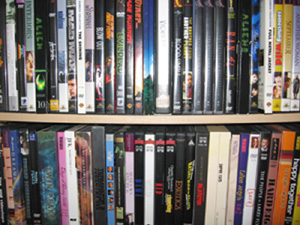 Since the “auteur theory” was conceived in the 1950s by a group of cinephilic Frenchmen who rarely saw the sun, it has come to dominate the way people make and perceive movies.
Since the “auteur theory” was conceived in the 1950s by a group of cinephilic Frenchmen who rarely saw the sun, it has come to dominate the way people make and perceive movies.
Submitted by Jeff on Thu, 04/06/2006 - 11:42
 Mixing and reinventing genres is the fuel for some of the best movies, these days. It is a productive way to cope with the postmodern dilemma: combine clichés to formulate new ones. It is also a very delicate process that must be done with care for themes, style, and narrative conventions.
Mixing and reinventing genres is the fuel for some of the best movies, these days. It is a productive way to cope with the postmodern dilemma: combine clichés to formulate new ones. It is also a very delicate process that must be done with care for themes, style, and narrative conventions.
Submitted by Jeff on Tue, 02/21/2006 - 00:20

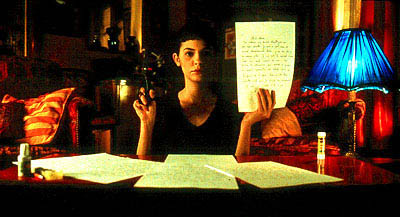
Until fairly recently, artists and art critics have viewed color as a secondary mode of expression, associating it with superficiality and instability. In the nineteenth century, realist painters contained color within the boundaries of line, arguing that this is the natural order of things. In the 1940s and ‘50s, realist filmmakers tended to use black and white for its associations with rawness, grittiness, and “the real.” David Batchelor has called this history one of “chromophobia,” wherein artists and critics fear color for its associations with the foreign, the superficial, and the unstable.
Submitted by Jeff on Mon, 01/30/2006 - 21:48
Cameron Crowe is not cool.
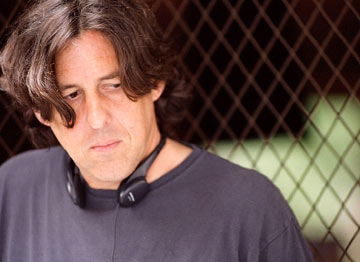
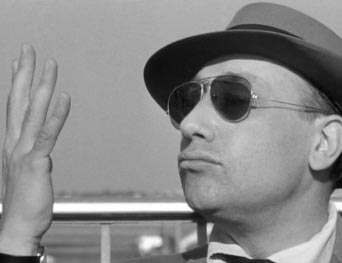
But since when did a filmmaker have to be cool? When did hipness and good art become synonymous? I suppose it happened some time around the premiere of Pulp Fiction, a film that was so much better than Forrest Gump that hipsters have been rolling their eyes at Hollywood and the Academy ever since. Under these auspices, I presume that the most influential filmmaker in the last fifty years must have been Jean-Pierre Melville, the director of such classics as Bob le flambeur and Le Samourai and the progenitor of what critics often refer to as the “birth of cool” in the 1950s. No doubt, Elvis had something to do with it as well.
If Cameron Crowe has never been cool – the square Richard Linklater – he wasn’t always so bullied. The cool kids tolerated Jerry Maguire and Almost Famous, even if those films did affirm the possibility of heterosexual love, and some of the cool kids even dug Say Anything (back when Cusack was a God among men). So when did Crowe become “uncool in the flesh”? Was it simply because Vanilla Sky sucked so much? More ambitious than his prior undertakings, Vanilla Sky committed two carnal sins: it was bad and uncommercial (and with Tom Cruise, no less). But with Elizabethtown, Crowe is back to his usual bag of tricks, combining screwball comedy, sentimentality, and voice-over narration – in short, living up to his reputation as a modern day Billy Wilder.
Pages